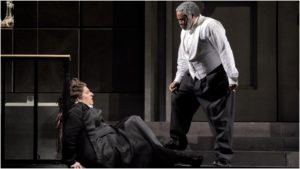
Lyric Opera of Chicago 2017-18 Review – Die Walküre: Owens and Goerke Excel As Strained Familial Relationships Draw Focus
By Santosh VenkataramanStaging a new production of a Ring cycle is always daunting because of history; no other opera is held up in comparison to previous productions more than Wagner’s grand gesamtkunstwerk. How David Pountney’s new production, now halfway complete at Lyric Opera of Chicago, holds up to history remains to be seen after his “Die Walküre” opened Wednesday night in front of an entranced crowd.
His “Das Rheingold,” seen at Lyric last season, was altogether spectacular, with so many of Pountney’s touches memorable ones, including Alberich’s conversion into a frog and the piled-up gold failing to block Fasolt’s vision of Freia. The twins themselves were placed high upon scaffolds with moving hands. Pountney’s vision was of a theatrical production in which stagehands maneuvering aspects of the sets is seen by the audience.
The creative team has said that this Ring cycle will be focused on the story, with the focus in “Walküre” in particular on the frayed relationships between the characters. And that’s where the action picked up with similar devices such as the scaffolds and cranes that help give this production the mechanical look; this is no modern setting yet it isn’t the natural world of the famed Otto Schenk “Ring” at the Met either.
This production also resisted any visual leitmotifs in conjunction with Wagner’s music, so focusing on the relationships is indeed where to begin. And none in “Die Walküre” is more important than the one between father and daughter with bass-baritone Eric Owens as Wotan and soprano Christine Goerke as Brünnhilde. Together they formed as formidable a duo for these roles as any in the opera world.
Wotan of the Future
When Owens sang his Wotan in “Rheingold” a year ago to mark his stage debut in the role, it was a bit surprising how tame his performance was. Any lingering concerns about the gifted Owens was put to rest with a virtuoso tour de force as the henpecked king in the second installment of the tetralogy.
Owens sang with strength, drama and gravitas throughout and showed no signs of fatigue. As good as his fellow cast members were – and they were excellent – Owens appropriately became the linchpin of every scene he was in as its commanding figure.
When he quarrels with Fricka in the beginning of Act two, we empathize with his dilemma in the same vein as any marital conflict. When he denounces Brünnhilde, we recognize that he is conflicted in that his anger is not 100 percent against his daughter, but also to the circumstances he faces. Owens will be synonymous with Wotan as the years progress.
Transcendent Valkyrie
Is it possible that a singer of Goerke’s quality is somehow underrated in the opera world? I have a hard time wondering whether she is best as Turandot, Elektra or as Brünnhilde – three roles in which she regularly delivers emphatic performances.
While Goerke’s power is her calling card, her dramatic skills were also on full display as Wotan’s daughter. From the way in which Brünnhilde was touched by the plight of Siegmund or her interaction with her fellow Valkyries, Goerke epitomizes a woman trying to navigate her way through the emotional tug of war that family often entails. Her Brünnhilde has wowed audiences in Toronto and Houston, with Chicago the latest to experience a level of excellence not often seen.
Distinction Throughout
The three acts of this “Die Walküre” were unique in how they were staged to varying degrees of success. The Act one scene in Hunding’s dwelling was set with a large fallen tree as per Wagner’s stage directions. This scene featured tenor Brandon Jovanovich as Siegmund, soprano Elisabet Strid as Sieglinde in her Lyric debut and bass Ain Anger as Hunding in another house debut. Yet this incestuous love scene between brother and sister somehow didn’t thrill vocally or visually.
The second act began in Valhalla with terrific drama between Owens’ Wotan and Fricka, portrayed once again by mezzo-soprano Tanja Ariane Baumgartner. Fricka’s comment about Wotan’s “boisterous daughter” as she upbraids her husband is part of a scene that does well in setting up the events ahead. Just as the fight between the twins in Rheingold was on raised platform, the fight between Siegmund and Hunding is staged the same way as the action starts to unravel in front of a discombobulated Wotan.
The third act with the Valkyries features some of the other sisters mounted on horses in a fairly common conceit perhaps best expressed in the 1985 Rochaix ring in Seattle. The Valkyries are clad in red and showcase their appetite for blood with male corpses that may not have made complete sense to the proceedings. How Pountney encircles Brünnhilde in flames is definitely suspenseful and happens after the full emotional power of Wotan and Brünnhilde is seen in their parting.
Wagner Done Right
Conductor Sir Andrew Davis and the orchestra did a fine job in more than augmenting what was on stage in bringing forth the drama. This was especially the case because in truth parts of “Walküre” can get tedious as expected for any work of this length. It’s a definite that this production will gain polish with each subsequent performance and my plan is to see this epic staging yet again during this run to further unpack its mysteries.


